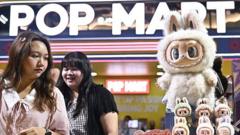Pop Mart, the renowned Beijing-based toy firm, has reported that its profits for the first half of the year are expected to skyrocket by at least 350%. This remarkable growth is attributed to a more than threefold increase in revenues, driven by the worldwide craze for Labubu dolls, cute elf-like figures with a quirky toothy grin. With a market capitalization exceeding $40 billion (£31.6 billion), the company credits its profitability to enhanced global brand recognition along with effective cost management strategies.
Adored by collectors, Labubu dolls have become a sensation, generating long queues and feverish demand in retail outlets across the globe. Pop Mart’s distinctive approach to marketing its toys in "blind boxes"—packaging that conceals what's inside—has met with criticism for possibly promoting gambling-like behavior. Launched in 2019, the Labubu dolls significantly bolstered Pop Mart’s stature as a key player in the toy industry, complementing a global network of over 2,000 vending machines and stores.
Since its public listing on the Hong Kong Stock Exchange in 2020, Pop Mart’s stock has surged nearly 600% over the past year. Notably, sales outside of mainland China accounted for nearly 40% of total revenues in 2024. The overwhelming popularity of Labubu dolls led some retailers worldwide to temporarily halt sales due to skyrocketing demand.
The rise of Labubu has been particularly pronounced in the US, aided by endorsements from celebrities like Kim Kardashian and Lisa from K-pop sensation Blackpink. M Science, an equity research firm, noted a staggering 5,000% increase in Labubu sales in the US in June compared to the previous year. Senior analyst Vinci Zhang remarked on the unprecedented nature of this sales growth in the toy sector.
With fewer than 40 stores in the US compared to around 400 in China, experts see immense potential for expansion. The buying frenzy has also given rise to a vibrant resale market, where original dolls priced around $10 can sell for hundreds, with one life-sized Labubu fetching a jaw-dropping $150,000 at a recent auction.
However, Labubu's remarkable success has not come without its challenges. The popularity of the dolls has led to a surge in counterfeit products, informally labeled as Lafufu dolls. In response, Chinese authorities have intensified efforts to combat this issue, recently seizing over 46,000 counterfeit Labubu figures in June as part of a crackdown on illegal sales.


















